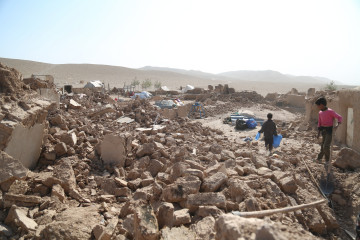

Families in western Afghanistan are reeling after a fourth earthquake in just over a week hit Herat Province, crumbling buildings and forcing people to flee once again, with thousands now living in tents exposed to fierce winds and dust storms.
The latest 6.3 magnitude earthquake hit a region 30 km (about 19 miles) outside of the city of Herat, in Herat Province on Sunday, shattering communities still reeling from the series of shallow and strong (6m+) earthquakes and aftershocks.
Nearly 20,000 people have now been affected across six districts, with at least 1,300 people killed and 1,800 injured, most of whom are women and children who were in their homes when the quakes hit.
"Most of the deaths and injuries have been women and children, who were at home when the earthquakes hit. Many survivors are terrified to go home. Four earthquakes have hit in a week"
The United Nations said more than 12,000 people, from some 1,700 families, are estimated to have been affected, adding that "100 percent" of homes were destroyed in 11 villages of Zenda Jan district.
Many people are sleeping in the open after their homes were destroyed, with many others terrified to go home due to fears of further shocks.
Massive dust storms also hit the region last week, hampering the aid response by damaging tents used as emergency shelters, and destroying mobile health and nutrition facilities.
“This is a crisis on top of a crisis," said Arshad Malik, Country Director for Save the Children in Afghanistan. "Even before this disaster, children were suffering from a devastating lack of food. At the same time, the harsh winter is approaching fast and children and families have no shelter or warm clothes to protect themselves."
Providing shelter on a large scale will be a challenge for Afghanistan's Taliban authorities, who seized power in August 2021, and have fractious relations with international aid organisations.
“Most of the deaths and injuries have been women and children, who were at home when the earthquakes hit. Many survivors are terrified to go home. Four earthquakes have hit in a week. It’s impossible to get out of fight mode when the ground is constantly moving," Arshad Malik added.
"Hundreds of tents have been set up on open plains to shelter families who have lost everything, which themselves are exposed to brutal winds and dust storms. Former villages are just rubble, and rock. What precious little belongings families once had are completely buried."
"Afghanistan is frequently hit by deadly earthquakes, but the weekend disaster is the worst to strike the impoverished country in more than 25 years"
In the provincial capital of Herat city — 30 kilometres (19 miles) southeast of the quake epicentres in hard-to-reach Zenda Jan district — Doctors Without Borders said the injured now faced a new ordeal.
|
"More than 340 patients discharged yesterday don't want to leave the hospital as they have no homes to return to," the charity said on social media site X.
Local and national officials gave conflicting counts of the number of dead and injured, but the disaster ministry has said 2,053 people died.
"We can't give exact numbers for dead and wounded as it is in flux," disaster management ministry spokesman Mullah Janan Sayeq told AFP.
Afghanistan is frequently hit by deadly earthquakes, but the weekend disaster is the worst to strike the impoverished country in more than 25 years.
Taliban authorities have banned women from working for the UN and non-governmental organisations (NGOs) in Afghanistan, making it difficult to assess family needs in deeply conservative parts of the country.
Amnesty International said the Taliban government should ensure that rescue and relief efforts are carried out "without discrimination" and guarantee unrestricted access to the affected regions to humanitarian agencies.
"It is critical that all assistance meets the needs of the most at-risk groups who often face compounded challenges in crisis situations, including women," said South Asia regional researcher Zaman Sultani.
Most rural homes in Afghanistan are made of mud and built around wooden support poles, with little in the way of modern steel reinforcement.
Multi-generational extended families generally live under the same roof, meaning disasters such as Saturday's quake can devastate local communities.
Afghanistan is already suffering a dire humanitarian crisis, with the widespread withdrawal of foreign aid following the Taliban's return to power.
The Herat province — home to around 1.9 million people on the border with Iran — has also been hit by a years-long drought that has crippled many hardscrabble farm communities. The country is prone to quakes, especially in the Hindu Kush mountain range, which lies near the junction of the Eurasian and Indian tectonic plates.
More than 1,000 people were killed and tens of thousands were left homeless in June last year after a 5.9-magnitude quake struck the impoverished province of Paktika and more than 4,000 people died in a magnitude 6.5 quake that struck Takhar province in 1998.





 Follow the Middle East's top stories in English at The New Arab on Google News
Follow the Middle East's top stories in English at The New Arab on Google News


